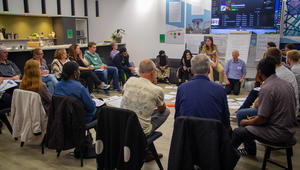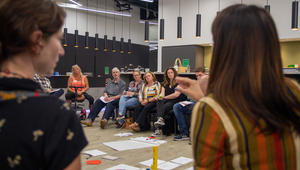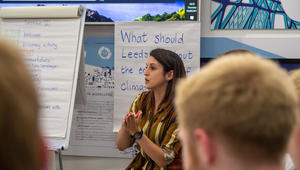In keeping with best practice in the design of Citizens’ Juries and Citizens’ Assemblies, the recruitment process for the Leeds Climate Change Citizens' Jury was agreed by the project oversight panel. The oversight panel (made up of representatives from 12 local organisations including Leeds City Council, the Chamber of Commerce, University of Leeds, Friends of the Earth, Racial Justice Network and others - see our FAQs for full list) agreed that the profile of the 25 people selected should reflect local diversity in terms of gender, age, ethnicity, disability, geography, attitude to climate change and how deprived or not the neighbourhood in which people live is.
With the agreement of the oversight panel we worked with the Sortition Foundation (an independent, not-for-profit organisation that promotes the use of stratified, random selection in decision-making) to design the recruitment process.
We used statistics from the Leeds Observatory website (maintained by Leeds City Council) to calculate the numbers of people we would need to recruit from different backgrounds in order to produce a profile of participants that broadly reflects the diversity of the population in the Leeds City Region.
In order to ensure that the profile of Jury participants reflected the different levels of deprivation experienced across different neighbourhoods in the Leeds city region the English indices of deprivation 2019 were used to recruit to. Participants were recruited across the ten different categories of multiple deprivation.
To get a representative sample of attitudes to climate change, the question asked in the Government’s BEIS public attitudes tracker (March 2019) was ‘how concerned, if at all, are you about climate change?’
In mid-August, 4,000 households across Leeds received a recruitment letter explaining the Citizens’ Jury and inviting those who are interested to either complete a very simple online form or use a freephone number to register their interest. The Sortition Foundation randomly selected the 4,000 addresses from the Royal Mail’s address database. The letters were sent to a selection of different geographies across Leeds: the city core; inner urban; outer urban; non-urban and market town.
One hundred and twenty-two people applied to join the jury, a typical response rate for such processes. Twenty-five people were recruited, with the expectation that numbers might drop to closer to 20 due to non-attendance. In session one, 23 people attended and in sessions two and three, 21 people attended.
The tables from the Sortition Foundation below show, in the first column, the percentage breakdowns of the wider population (wherever possible based on statistics for Leeds in each category). The second column shows the percentage breakdown of those that applied to join the jury and the third column shows statistics for those who were invited to attend the first session. Categories for the rows are (from top):
- Male/female
- Age
- Indices of multiple deprivation
- Concern about climate change
- Disability
- Ethnicity








